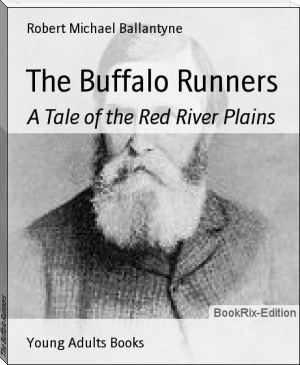The Buffalo Runners - Robert Michael Ballantyne (read aloud .txt) 📗

- Author: Robert Michael Ballantyne
Book online «The Buffalo Runners - Robert Michael Ballantyne (read aloud .txt) 📗». Author Robert Michael Ballantyne
"Ay, ay, sir!" responded the nautical warrior, as he laid about him with an enormous buffalo robe, which was the only weapon that seemed sufficiently suited to his gigantic frame; "never say die as long as there's a shot in the locker."
Elise stood behind him, lost in admiration, and giving an imbecile flap now and then with a towel to anything that happened to come in front of her.
Elspie was more self-possessed. She tried to wield a jack-towel with some effect, while Dan, Fergus, Duncan junior, Bourassin, Andre Morel, and others ably, but uselessly, supported their heroic leader. La Certe, who chanced to be there at the time, went actively about encouraging others to do their very best. Old Peg made a feeble effort to do what she conceived to be her duty, and Okematan stood by, calmly looking on--his grave countenance exhibiting no symptom of emotion, but his mind filled with intense surprise, not unmingled with pity, for the Palefaces who displayed such an amount of energy in attempting the impossible.
That self-defence, in the circumstances, was indeed impossible soon became apparent, for the enemy descended in such clouds that they filled up the half-formed ditch, extinguished the fires with their dead bodies, defied the blanket-warriors, and swarmed not only into the garden of old Duncan McKay but overwhelmed the whole land.
Darkness and exhaustion from the fight prevented the people of Ben Nevis Hall and Prairie Cottage from at first comprehending the extent of the calamity with which they had thus been visited, but enough had been seen to convince McKay that his garden was doomed. When he at last allowed the sad truth to force itself into his mind he suffered Elspie to lead him into the house.
"Don't grieve, daddy," she said, in a low comforting tone; "perhaps it won't be as bad as it seems."
"Fetch me my pipe, lass," he said on reaching his bedroom.
"Goot-night to you, my tear," he added, on receiving the implement of consolation.
"Won't you eat--or drink--something, daddy dear?"
"Nothing--nothing. Leave me now. We hev had a goot fight, whatever, an' it iss to bed I will be goin' now."
Left alone the old man lay down in his warrior-harness, so to speak, lighted his pipe, smoked himself into a sort of philosophical contempt for everything under the sun, moon, and stars, and finally dropped his sufferings, as well as his pipe, by falling into a profound slumber.
Next morning when the people of Red River arose, they became fully aware of the disaster that had befallen them. The grasshoppers had made what Jenkins styled a clean sweep from stem to stern. Crops, gardens, and every green herb in the settlement had perished; and all the sanguine hopes of the long-suffering settlers were blighted once more.
Before passing from this subject it may be as well to mention that the devastating hosts which visited the colony at this time left behind them that which turned out to be a worse affliction than themselves. They had deposited their larvae in the ground, and, about the end of the June following, countless myriads of young grasshoppers issued forth to overrun the fields. They swarmed in such masses as to be two, three, and--in some places near water--even four inches deep. Along the rivers they were found in heaps like sea-weed, and the water was almost poisoned by them. Every vegetable substance was devoured--the leaves and even bark of trees were eaten up, the grain vanished as fast as it appeared above ground, everything was stripped to the bare stalk, and ultimately, when they died in myriads, the decomposition of their dead bodies was more offensive than their living presence.
Thus the settlers were driven by stress of misfortune once again to the plains of Pembina, and obliged to consort with the Red-men and the half-breeds, in obtaining sustenance for their families by means of the gun, line, trap, and snare.
CHAPTER TWENTY.
LITTLE BILL BECOMES A DIFFICULTY.
We must now pass over another winter, during which the Red River settlers had to sustain life as they best might--acquiring, however, in doing so, an expertness in the use of gun and trap and fishing-line, and in all the arts of the savages, which enabled them to act with more independence, and to sustain themselves and their families in greater comfort than before.
Spring, with all its brightness, warmth, and suggestiveness had returned to cheer the hearts of men; and, really, those who have never experienced the long six-or-eight-months' winter of Rupert's Land can form no conception of the feelings with which the body--to say nothing of the soul--opens up and expands itself, so to speak, in order to receive and fully appreciate the sweet influences of spring.
For one thing, seven or eight months of cold, biting, steely frost causes one almost to forget that there ever was such a thing as summer heat, summer scents, summer sounds, or summer skies. The first thaw is therefore like the glad, unexpected meeting of a dear old friend; and the trumpet voice of the first goose, the whirring wing of the first duck, and the whistle of the first plover, sounds like the music of the spheres to one's long unaccustomed ears. Then the trickle of water gives one something like a new sensation. It may be but a thread of liquid no thicker than a pipe-stem faintly heard by an attentive ear tinkling in the cold depths far under the ice or snow, but it is liquid, not solid, water. It is suggestive of motion. It had almost been forgotten as a sound of the long past which had forsaken the terrestrial ball for ever.
It does not take a powerful imagination to swell a tiny stream to a rivulet, a river, a lake, a mighty ocean. Shut your eyes for a moment, and, in memory, the ice and snow vanish; the streams flow as in the days of old; flowers come again to gladden the eyes and--but why trouble you, good reader, with all this? We feel, sadly, that unless you have tasted the northern winter no description, however graphic, will enable you to drink in the spirit of the northern spring.
About this time Okematan, the Cree chief, took it into his head that he would go a-hunting.
This last word does not suggest to a dweller in the wilderness that crossing of ploughed lands on horseback, and leaping of hedges, etcetera, which it conveys to the mind of an Englishman. The Cree chief's notion of spring-hunting was, getting into a birch-bark canoe, with or without a comrade, and going forth on the lakes and rivers of the wilderness with plenty of powder and shot, to visit the native home of the wild-goose, the wild-duck, the pelican, the plover, and the swan.
For such a trip not much is essential. Besides the gun and ammunition referred to, Okematan carried a blanket, a hatchet, several extra pairs of moccasins, a tin kettle in which to boil food, a fire-bag for steel, flint, and tinder, with a small supply of tobacco.
On hearing of his intention, Dan Davidson resolved to accompany him. Dan had by that time associated so much with the chief that he had learned to speak his language with facility. Indeed nearly all the settlers who had a turn for languages had by that time acquired a smattering more or less of Indian and French.
"You see," said Dan to the chief, "there is not much doing on the farm just now, and I want to see a little of the country round about, so, if you don't object to my company, I'd like to go."
"The Cree chief will be proud to have the company of the Paleface chief," replied the Indian, with grave courtesy.
Dan wanted to say "All right," but was ignorant of the Cree equivalent for that familiar phrase; he therefore substituted the more sober and correct, "It is well."
"But," said he, "you must not call me a Paleface chief, for I am only an ordinary man in my own land--what you would call one of the braves."
"Okematan is thought to have a good judgment among his people," returned the Indian, "though he has not the snows of many winters on his head, and he thinks that if Dan'el had stayed in the wigwams of his people beyond the Great Salt Lake, he would have been a chief."
"It may be so, Okematan, though I doubt it," replied Dan, "but that is a point which cannot now be proved. Meanwhile, my ambition at present is to become a great hunter, and I want you to teach me."
The chief, who was gratified by the way in which this was put, gladly agreed to the proposal.
"There is another man who would like to go with us," said Davidson. "My friend, Fergus McKay, is anxious, I know, to see more of the lands of the Indian. You have no objection to his going, I suppose?--in another canoe of course, for three would be too many in your small canoe."
Okematan had no objection.
"Three would not be too many in the canoe," he said, "but two are better for hunting."
"Very good. But we will want a fourth to make two in each canoe. Whom shall we invite?"
"Okematan's counsel is," answered the chief, "to take a brave who is young and strong and active; whose eye is quick and his hand steady; whose heart never comes into his throat when danger faces him; whose face does not grow pale at the sight of approaching death; whose heart is as the heart of the grisly bear for courage, and yet tender as the heart of a Paleface squaw; whose hand can accomplish whatever his head plans, and whose tongue is able to make a sick man smile."
Davidson smiled to himself at this description, which the chief uttered with the sententious gravity that would have characterised his speech and bearing in a council of war.
"A most notable comrade, good Okematan; but where are we to find him, for I know nobody who comes near to that description."
"He dwells in your own wigwam," returned the chief.
"In Prairie Cottage?" exclaimed the other with a puzzled air. "You can't mean my brother Peter, surely, for he is about as grave as yourself."
"Okematan means the young brave who loves his little brother."
"What! Archie Sinclair?" exclaimed Dan, with a surprised look. "I had no idea you had so high an opinion of him."
"Okematan has seen much of Arch-ee: has watched him. He sees that he thinks nothing of himself; that he thinks always for the sick brother, Leetle Beel, and that he will yet be a great chief among the Palefaces."
"Well, now you come to mention it, there _is_ something about Archie that puts him high above other boys; and I suppose his unselfishness has much to do with it; but don't you think he's too young, and hardly strong enough?"
"He is not young. He is fifty years old in wisdom. He is very strong for his size, and he is _willing_, which makes his strength double."
"But he will never consent to leave Little Bill," said Dan.
"Okematan had fears of that," returned the Indian, with, for the first time, a look





Comments (0)